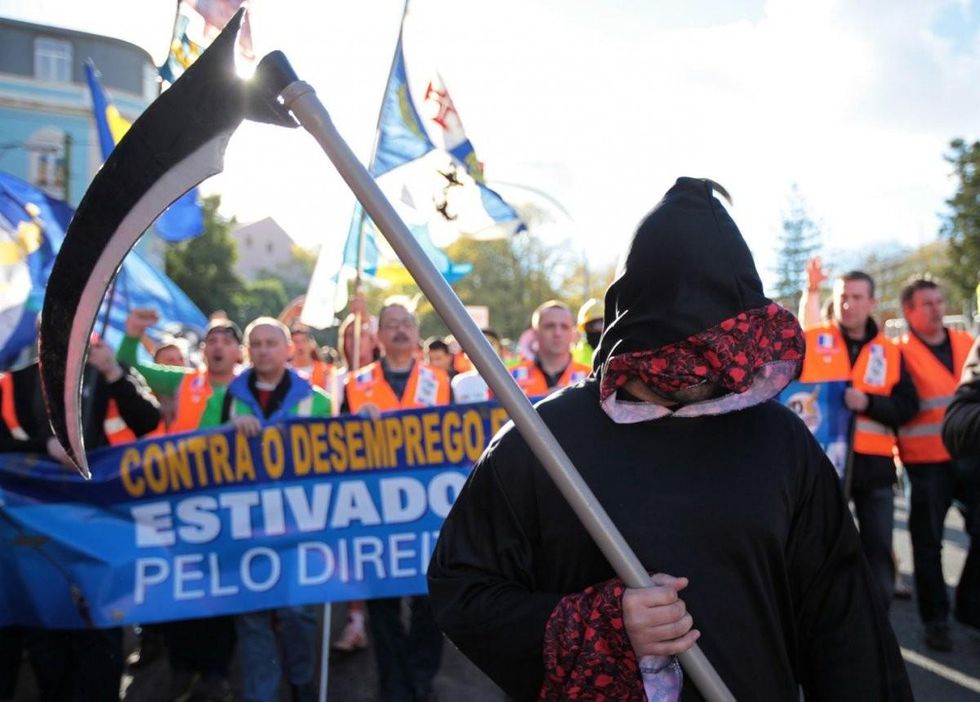

SUBSCRIBE TO OUR FREE NEWSLETTER
Daily news & progressive opinion—funded by the people, not the corporations—delivered straight to your inbox.
5
#000000
#FFFFFF
To donate by check, phone, or other method, see our More Ways to Give page.


Daily news & progressive opinion—funded by the people, not the corporations—delivered straight to your inbox.

October brought in the 14th consecutive monthly unemployment record since September 2011 when unemployment hit 10.3 percent. 18.7 million were out of work across the region in October up from from 18.49 million the month before, the Eurostat data agency said.
The situation is even worse for young workers. Almost one in four young Europeans are out of work. In Greece, 57 percent of under 25s were jobless in August, and in Spain 55.9 percent were jobless in October, according to the latest figures.
Spain and Greece also have the region's highest overall unemployment rates -- both over 25 percent.
"But the future looks even bleaker for those in search of work. European Union forecasts earlier this month saw unemployment set to peak at almost 12 percent next year due to weak domestic demand as governments continue on the path of austerity," Agence France-Presse reports.
The governments of Spain and Greece have worked tirelessly to appease European lenders' requests through slashing public budgets, to the ire of public workers.
As a result, both countries have seen massive anti-austerity protest movements, including recurring general strikes, throughout the last two years despite heavy handed policing.
Most recently, public health workers in Spain continued their fight against austerity and the privatization of public services on Friday morning, as organizers delivered almost one million signatures to the Ministry of Health in Madrid, asking lawmakers to resist proposed privatization of the public health system there, which has been included in a public health system austerity plan scheduled to go into effect in 2013.
Hundreds of supporters and members of the Workers and Members Platform in Defense of Public Health gathered outside of the Ministry as the petition was delivered.
On Monday, health workers went on strike to protest the proposed privatization -- which will place the operation of six hospitals in Madrid in private hands. Organizers say the move will make it far more costly for patients to seek treatment, as well as take away many jobs.
"We want public healthcare for all," a doctor who asked not to be named told El Pais.
"They're looking to make healthcare only available for the powerful," 85-year-old patient Valentin Huerta stated. "We're headed back to where we were 50 years ago."

Dear Common Dreams reader, The U.S. is on a fast track to authoritarianism like nothing I've ever seen. Meanwhile, corporate news outlets are utterly capitulating to Trump, twisting their coverage to avoid drawing his ire while lining up to stuff cash in his pockets. That's why I believe that Common Dreams is doing the best and most consequential reporting that we've ever done. Our small but mighty team is a progressive reporting powerhouse, covering the news every day that the corporate media never will. Our mission has always been simple: To inform. To inspire. And to ignite change for the common good. Now here's the key piece that I want all our readers to understand: None of this would be possible without your financial support. That's not just some fundraising cliche. It's the absolute and literal truth. We don't accept corporate advertising and never will. We don't have a paywall because we don't think people should be blocked from critical news based on their ability to pay. Everything we do is funded by the donations of readers like you. Will you donate now to help power the nonprofit, independent reporting of Common Dreams? Thank you for being a vital member of our community. Together, we can keep independent journalism alive when it’s needed most. - Craig Brown, Co-founder |

October brought in the 14th consecutive monthly unemployment record since September 2011 when unemployment hit 10.3 percent. 18.7 million were out of work across the region in October up from from 18.49 million the month before, the Eurostat data agency said.
The situation is even worse for young workers. Almost one in four young Europeans are out of work. In Greece, 57 percent of under 25s were jobless in August, and in Spain 55.9 percent were jobless in October, according to the latest figures.
Spain and Greece also have the region's highest overall unemployment rates -- both over 25 percent.
"But the future looks even bleaker for those in search of work. European Union forecasts earlier this month saw unemployment set to peak at almost 12 percent next year due to weak domestic demand as governments continue on the path of austerity," Agence France-Presse reports.
The governments of Spain and Greece have worked tirelessly to appease European lenders' requests through slashing public budgets, to the ire of public workers.
As a result, both countries have seen massive anti-austerity protest movements, including recurring general strikes, throughout the last two years despite heavy handed policing.
Most recently, public health workers in Spain continued their fight against austerity and the privatization of public services on Friday morning, as organizers delivered almost one million signatures to the Ministry of Health in Madrid, asking lawmakers to resist proposed privatization of the public health system there, which has been included in a public health system austerity plan scheduled to go into effect in 2013.
Hundreds of supporters and members of the Workers and Members Platform in Defense of Public Health gathered outside of the Ministry as the petition was delivered.
On Monday, health workers went on strike to protest the proposed privatization -- which will place the operation of six hospitals in Madrid in private hands. Organizers say the move will make it far more costly for patients to seek treatment, as well as take away many jobs.
"We want public healthcare for all," a doctor who asked not to be named told El Pais.
"They're looking to make healthcare only available for the powerful," 85-year-old patient Valentin Huerta stated. "We're headed back to where we were 50 years ago."


October brought in the 14th consecutive monthly unemployment record since September 2011 when unemployment hit 10.3 percent. 18.7 million were out of work across the region in October up from from 18.49 million the month before, the Eurostat data agency said.
The situation is even worse for young workers. Almost one in four young Europeans are out of work. In Greece, 57 percent of under 25s were jobless in August, and in Spain 55.9 percent were jobless in October, according to the latest figures.
Spain and Greece also have the region's highest overall unemployment rates -- both over 25 percent.
"But the future looks even bleaker for those in search of work. European Union forecasts earlier this month saw unemployment set to peak at almost 12 percent next year due to weak domestic demand as governments continue on the path of austerity," Agence France-Presse reports.
The governments of Spain and Greece have worked tirelessly to appease European lenders' requests through slashing public budgets, to the ire of public workers.
As a result, both countries have seen massive anti-austerity protest movements, including recurring general strikes, throughout the last two years despite heavy handed policing.
Most recently, public health workers in Spain continued their fight against austerity and the privatization of public services on Friday morning, as organizers delivered almost one million signatures to the Ministry of Health in Madrid, asking lawmakers to resist proposed privatization of the public health system there, which has been included in a public health system austerity plan scheduled to go into effect in 2013.
Hundreds of supporters and members of the Workers and Members Platform in Defense of Public Health gathered outside of the Ministry as the petition was delivered.
On Monday, health workers went on strike to protest the proposed privatization -- which will place the operation of six hospitals in Madrid in private hands. Organizers say the move will make it far more costly for patients to seek treatment, as well as take away many jobs.
"We want public healthcare for all," a doctor who asked not to be named told El Pais.
"They're looking to make healthcare only available for the powerful," 85-year-old patient Valentin Huerta stated. "We're headed back to where we were 50 years ago."
